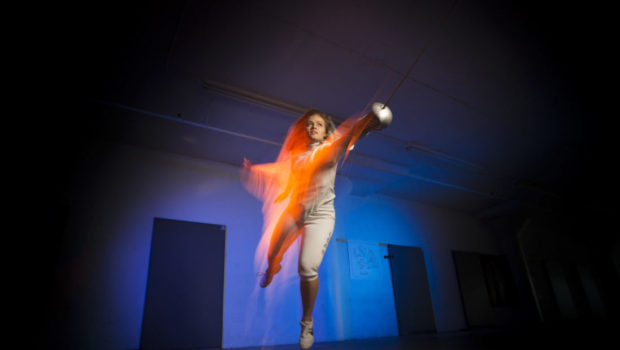
ATTACKING LIFE: U.S. Olympic Fencer Dagmara Wozniak Brings Grace to Combat Sport
by Christopher M. Halleron
photos by Craig Wallace Dale
Westeros has Arya Stark. Hoboken has Dagmara Wozniak.
Emerging as a star after medaling in fencing for Team USA in the Rio Olympics last summer, Wozniak maintains a balanced regimen, making sure not to over-exert herself as she looks ahead to the next Games in Tokyo.
“You have to be smart about how you train,” she says. “Most of my physical training is about balancing it out. Due to the fact that fencing is so one-sided—you get a lot of injuries on one side of your body. My left quad is much bigger than my right; my right calf is much bigger than my left. Sometimes you’re so offset, you can hurt your back, and knee injuries are really common because you’re working that joint so much.”
Wozniak, 28, lives in Hoboken with her husband, Marat Israelin—an accomplished international fencer who also runs the program at St. Peter’s Prep. We caught up with them in Jersey City’s Cobra Fencing Club (629 Grove Street) to learn more about Wozniak, the sport of fencing, and what it takes to compete at a world-class level.
LIVE BY THE SWORD
Wozniak was born in Poland. At the age of one, she and her family immigrated to the United States.
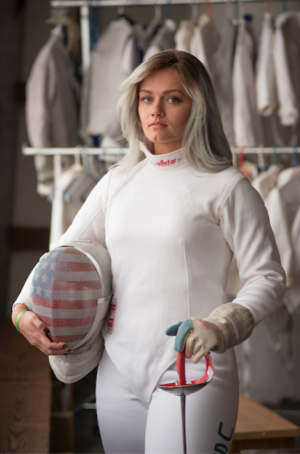 “My parents came from Poland searching for a better life,” she says, “and I’m glad they did.”
“My parents came from Poland searching for a better life,” she says, “and I’m glad they did.”
Around the age of 9, Wozniak first got involved with the sport that would change her life forever.
“I did karate, gymnastics, and Polish dancing before I got involved in fencing. My Dad saw that I was really active as a child,” she says, “meanwhile the coach was a Polish coach at a Polish cultural foundation center in my hometown. So my Dad saw a chance for me to learn more about the language as well as fencing.” She adds, “It was never like, ‘we have a plan to make a champion out of her’—that just sort of happened.”
One of the main reasons Wozniak has done so well in fencing is that she genuinely enjoys it.
“I fell in love with the sport because it’s different; it’s badass… and you get to hit other kids and not get in trouble,” she says. “I saw something beautiful about it from the start.”
THE ARTISTRY OF FENCING
To the outsider, fencing might be a bit of a mystery. Rather than some clunky, bone-shattering swordfight you’d see in Game of Thrones, there are techniques, nuances and variables that might be subtle to the layperson.
“The most cliché description is a physical chess game,” says Wozniak. “Regardless of the speed, you want to be one or two steps ahead of your opponent—you need to be physically setting up a trap so you can score points on your opponent.”
Once a basic understanding is achieved, the appeal of fencing as a spectator sport becomes all the more apparent. “When you have combat sports, there are a lot of elements,” says Wozniak. “Not to take anything away from track & field or swimming, but the water never changes on you—it’s the same temperature, it’s the same type of consistency or resistance. It’s a battle against you. Whereas with combat sports,” she adds, “it’s about you and making sure you’re in the right mindset—but then there’s also something so unpredictable on the other end. So now, in order to win the match I need to adjust in real time and score points.”
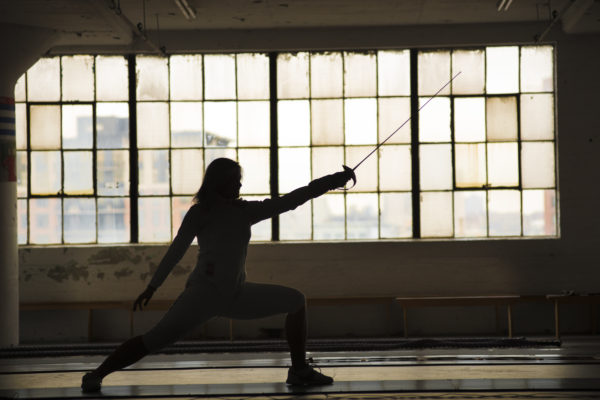
There is the obvious physical competition, but it’s a battle of the mind as well. “It’s not necessarily who is harder, faster stronger,” says Wozniak. “Sometimes faster is worse—you need to slow yourself down, pull your opponent out a bit and pull their mistakes out, then capitalize on them and get a point, which will bring you one step closer to winning.”
It’s that uncertainty of combat sports that makes them so thrilling—to the competitor and spectator alike. “There are people who I win against often, and I don’t think about it twice,” says Wozniak. “Then the next time they bring something different to the table and I might not adjust in time. There are things that you can do statistically to be the one who should win at a competition, but on the actual day of the competition it’s anyone’s game. That’s the beauty of it.”
She adds, “There’s a lot of preparation—physical, mental. But on the day of the competition it’s 90-95% mental. If you’re not executing at the right time, you’re done.”
SLASHING THROUGH
Life is all about making the right choices. Early on, Wozniak saw the benefits of choosing to commit to the sport of fencing.
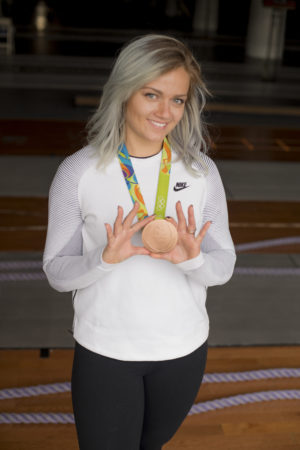 “By age 15 I had already traveled to so many countries with my teammates,” she says. “Fencing has brought me so much. I’ve made lifelong friends, nationally and internationally. It has taught me so much about myself as a person—how to apply myself, how to lose, how to pick myself back up. It has taught me planning, goal-setting—it has taught me more than school, college, anything…”
“By age 15 I had already traveled to so many countries with my teammates,” she says. “Fencing has brought me so much. I’ve made lifelong friends, nationally and internationally. It has taught me so much about myself as a person—how to apply myself, how to lose, how to pick myself back up. It has taught me planning, goal-setting—it has taught me more than school, college, anything…”
Initially training under Janusz Mlynek at the Polish-American Fencing School, at the age of 15, Wozniak began to work with 5-time Olympic Fencing Coach Yury Gelman at the Manhattan Fencing Center.
“Mom was so scared to drive me into Newark and put me on the PATH,” says Wozniak. “My coach had an idea who I was because I had come up against some of his students. He asked me what are my goals and I said, ‘I wanted to be the best in the world.’ He asked if I was willing to do everything he said, and I said ‘OK.’”
It was a moment that would eventually change her life. “At the end of the conversation I said to myself, I think I just sold my soul to the devil,” admits Wozniak, “but he’s a great coach and I wouldn’t be anywhere without the hard work we’ve done together and the patience he’s had. I think the older I got, the more I could see the trust—trusting me as an adult, trusting me as an athlete.”
That trust has certainly paid off. “I made my first national team in 2005 and I haven’t missed a national team since.”
AT EASE
After the session at Cobra Fencing, we adjourned to Elysian Café (1001 Washington Street), one of Wozniak’s favorite spots in Hoboken—joined by one of her favorite people, Niki Klaczany, who owns Up & Out Salons in Hoboken.

“Niki and I have been friends since we were one-year old,” says Wozniak. “She’s been styling my hair for years.” Klaczany’s work made quite an impression in Rio, as Wozniak sported a deep purple hairdo for the Olympics this past summer. “Niki is great at her trade, so we experimented a lot and creativity and curiosity combined to come up with that purple monstrosity.”
Says Wozniak, “It’s definitely self-expression and not being afraid to express who I am—if that’s purple hair or shaving my head or whatever, just not being afraid to do that. We dabbled in the color a little bit, and the more people were shocked that I was doing it, I started going in the darker direction. Because I wondered why people were upset by it—it’s hair.”
It was Klaczany who turned Wozniak onto Hoboken. “She convinced me to come out here—it’s a great place to meet new people, great restaurants. It’s a nice, homey town that’s not too big; you don’t feel like people are living on top of you. Living in Queens, travelling back and forth (to visit family) in New Jersey, it was expensive. It was a good compromise between going to see my family and getting into the city to practice.”
LEADING THE CHARGE
In meeting Wozniak, one senses the empowerment that comes from being a world-class female athlete, while seeing the humility that comes with strong character.
“My teammate made the point that a lot of girls come up to us and say, ‘we started something because we saw you on TV.’ So I think the great representation of female athletes across the board—especially in fencing—is giving girls this kind of possibility that they can do anything,” she says.
“Don’t get discouraged… in anything—it doesn’t have to be fencing. I think a lot of kids try something and mess up, or lose, or get benched and they give up on it. Life is about getting a lot of losses before you get even one win.”
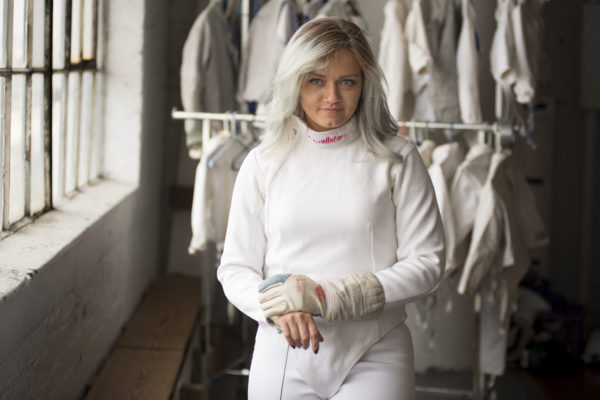

 Previous Article
Previous Article Next Article
Next Article BILL’S SPACE SHOW: New Season, Safer Space
BILL’S SPACE SHOW: New Season, Safer Space  The Beat Goes On — Examining the Current State of the Hoboken Live Music Scene
The Beat Goes On — Examining the Current State of the Hoboken Live Music Scene  RAIN FALLS, HOBOKEN FLOODS: Mayor Defends Flood Mitigation Efforts in Wake of Fay; Labels Sewer Replacement ‘Impractical’
RAIN FALLS, HOBOKEN FLOODS: Mayor Defends Flood Mitigation Efforts in Wake of Fay; Labels Sewer Replacement ‘Impractical’  Hoboken’s NoVia (North of the Viaduct): Not Just Viable — Vivacious
Hoboken’s NoVia (North of the Viaduct): Not Just Viable — Vivacious  LIME WEDGE: Divided Over Scooters, Hoboken Needs To Get It Together — EDITORIAL
LIME WEDGE: Divided Over Scooters, Hoboken Needs To Get It Together — EDITORIAL 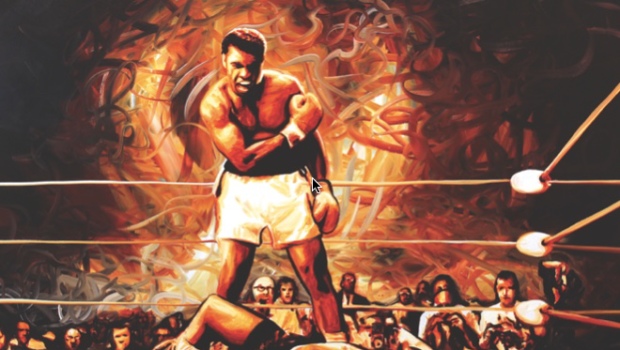 Art Lives Here
Art Lives Here 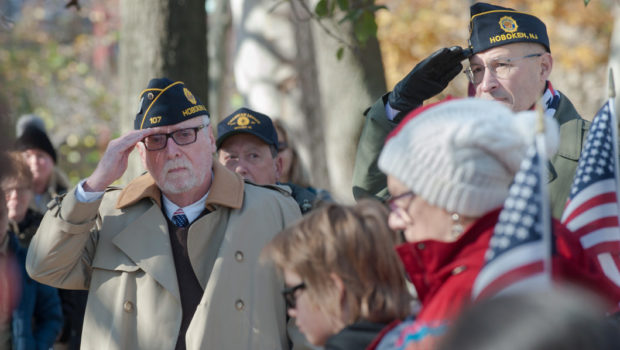 THE GUNS FELL SILENT: Hoboken Veterans Day Commemorates the Centennial of World War I — PHOTO GALLERY
THE GUNS FELL SILENT: Hoboken Veterans Day Commemorates the Centennial of World War I — PHOTO GALLERY 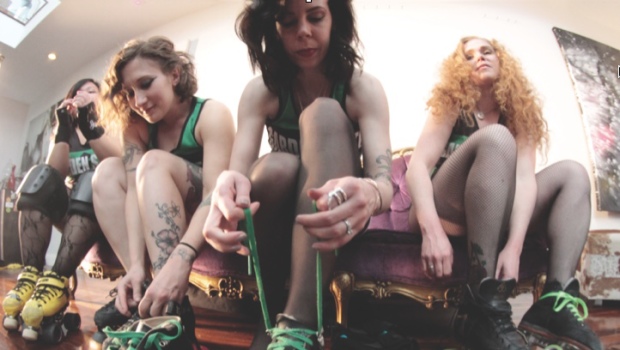 Roller Girls Rule
Roller Girls Rule